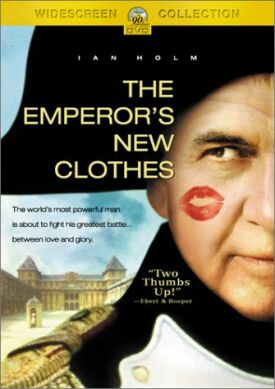Emperor’s New Clothes, The
The Emperor’s New Clothes, adapted from the novel The Death of Napoleon by Simon Leys and directed by Alan Taylor is a charming “counterfactual” history so cleverly written and so competently acted you are likely to find that it almost makes you forget the sheer preposterousness of its premiss. This is that the Emperor Napoleon, in exile on St. Helena, manages to change places with a double, an ordinary seaman called Eugène Lenormand who is serving on a French merchant vessel carrying molasses to Brest. The plan is for him to land at Brest, proclaim his arrival as the imposter on St. Helena simultaneously unmasks himself and proceed to put forth the call for his loyal troops to rally around him once again.
But it all goes wrong. Instead of landing at Brest, the master of the ship goes on to Brussels where he can get a better price for his molasses. Napoleon is left to make his way by stagecoach back to France while the double finds that he rather likes being Napoleon and decides not to unmask himself after all. “That man was emperor for 18 years while I was scrubbing the decks of his ships,” he tells the Emperor’s horrified flunkies and hangers on. “Well now it’s my turn.” And so it is that Napoleon arrives in Paris indistinguishable from the madmen, of whom we see a whole asylum-full, who only believe themselves to be Napoleon.
This raises the very interesting philosophical question of just what it is that distinguishes a former Emperor who thinks he’s Napoleon from anyone else who thinks he’s Napoleon. And, slightly less interesting, is the question of what makes one man a Napoleon and another a common sailor — and whether whatever it is is repeatable or only the result of historical accident. There is some attention paid to the latter question, especially in a marvelously comic account of how the Emperor’s strategic genius and powers of leadership are employed in organizing his neighbors to sell off an over-supply of Provençal watermelons at a profit. But on the whole the film avoids its more serious implications to concentrate instead on pushing what is in my view the rather dubious proposition that if Napoleon had been happily married to a good wife he’d have lost his desire to conquer the world and settled down to contentment as a Parisian costermonger.
That summary is a bit of an oversimplification, but not much. The movie takes a typically modern and uncomprehending attitude to traditional ideas of honor and glory, the thirst for which it imagines as an emanation of some anomalous and unhappy psychological state. There are also a couple of very large holes in the narrative. The sailor could hardly have been put ashore at St. Helena and the Emperor put in his place without the knowledge of the ship’s master, for instance. Nor is it credible to suppose that Napoleon could have appeared in Paris after only six years of exile, without any disguise, and been recognized by no one.
Yet I did not find any of these doubts or shortcomings insuperable difficulties in the way of my enjoyment of the movie. This is mainly on account of the performance of the great Ian Holm in the roles both of Napoleon and Lenormand and the lovely Iben Hjejle (High Fidelity, Mifune) as Pumpkin, the young widow with whom the quondam Emperor finds happiness at last. Or at first, one supposes, since the film seems to imply that his career as Emperor was the result not only of talent, ambition and opportunity but also of domestic discontent. Josephine loved her jewels, he comments ruefully.
This is one of the many small pleasures in which the film has decided to specialize. There are many others, including Napoleon’s first sight of Lenormand — upon which he remarks to his aide: “What are we going to do? He looks nothing like me” — and the idiot grin on the sailor’s face as he is given the imperial treatment. I also found it funny rather than off-putting that the sailor is able to take up where Napoleon left off in the dictation of his memoirs without missing a beat. Each is as much of a fantasist as the other, in his own way, and an echo of the Emperor’s refusal to acknowledge the similarity in their appearances comes as he sees a copy of the bogus memoir in a bookshop and begins tearing it up in fury.
I even found it genuinely touching when the Emperor revealed himself to Pumpkin and she refused to believe him. “I offer you a world and you do not believe me?” he asks her.
“I believe in you, Eugène,” she cries.
“Eugène Lenormand is nothing!”
“He is everything to me.”
“I am Napoleon!”
“No. I hate Napoleon. He has filled France with widows and orphans. He took my husband. I won’t let him take you.”
There is a real note of feminine authenticity in this flare-up of resentment against the whole male world that must always cost women such heartache. So much so, indeed, as to make you wish that there were, as there is not, a corresponding sense of authenticity about the Emperor’s ultimate abdication in favor of such a charming and delightful creature as this.
Discover more from James Bowman
Subscribe to get the latest posts to your email.







